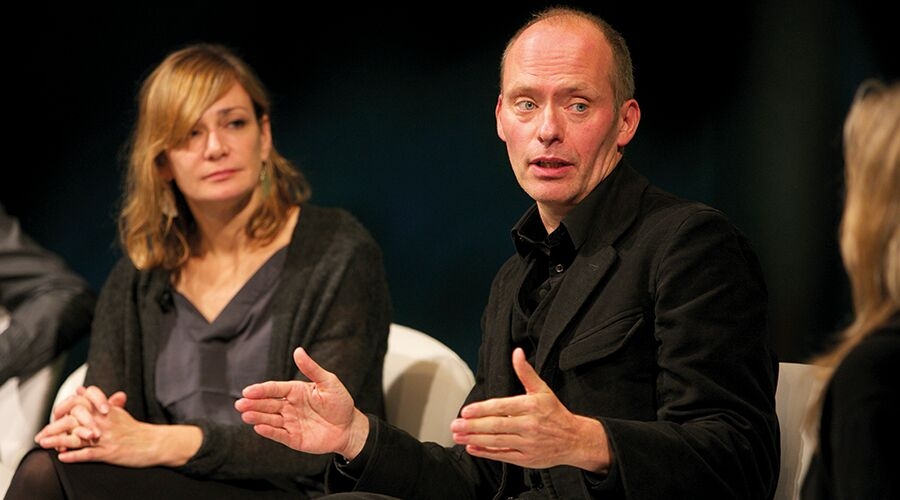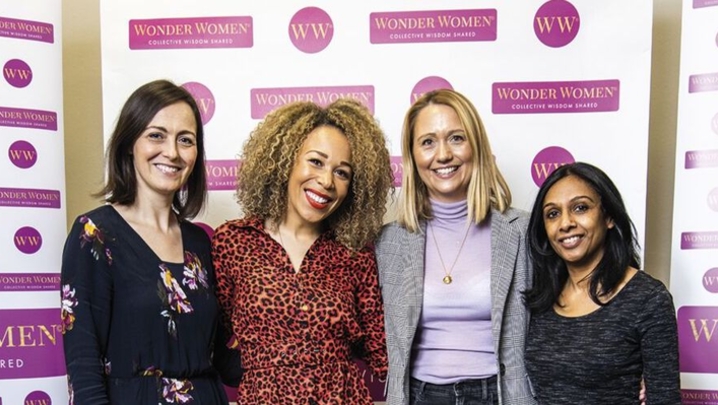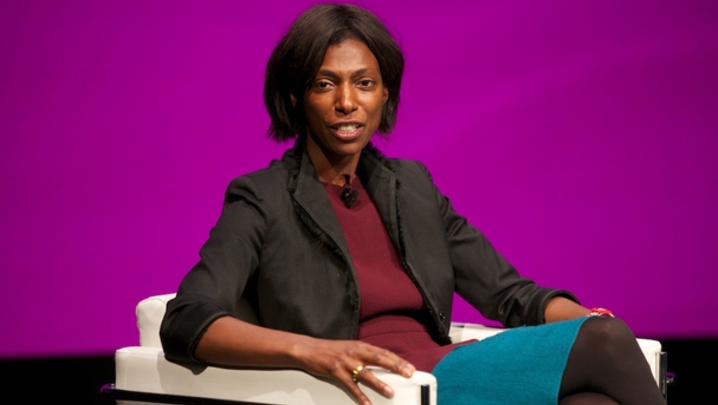Cambridge Convention 2015 Session Six: Drama is more important than ever before in global markets. Is the UK or the US writing model the best way to succeed?
It is the question that British writers and commissioners perennially ask: which system works best – the UK’s single voice or the US’s showrunner model?
Former head of BBC Worldwide Productions turned independent producer Jane Tranter tried to answer this key question with a panel of writers, who outlined their experiences to see how they compared.
She pointed out that, during her seven years in the US, it was not a subject the industry there generally debated openly.
First of all, Tranter wanted to address the curveball question that culture secretary John Whittingdale had raised in his keynote speech, about whether BBC One should schedule its Ten O’Clock News opposite ITV News at Ten.
“Why British drama has got so strong since 2000 is because Greg Dyke, Alan Yentob and Mark Thompson worked together to move the news on the BBC to 10:00pm so that drama could play in a proper slot where the audience wanted it,” said Tranter.
“The only thing I would say to John Whittingdale is that he must think the BBC is in such great shape that he can start commenting on something that very clearly works. There can’t be anything about the BBC that is not working, if he can pick on that,” concluded Tranter to applause from the audience.

From there, it was on to hearing from Skins and Nature Boy writer Bryan Elsley, who runs Balloon Entertainment with Harry Enfield.
Having worked on the US version of E4 hit Skins for MTV (cancelled after one season), Elsley was able to outline the key differences between the UK and American writing systems.
He said that “a high level of organisation is a very big feature of the US model”. Elsley added that the “first time I worked in an American writers’ room, they gave me a Ford Mustang and a parking place with my name on it.
“It is a very corporate model, and writers are expected to be there with their pads at the gate at 9:00am every morning and they will leave at 6:00.”
He said that the main difference between the US and British systems was the structure: the US version had evolved around the annual advertising market. An overarching showrunner sat at the top of a hierarchy.
There is more flexibility in the US than there used to be. Elsley said writers’ rooms still had: “a showrunner; someone probably called a co-executive producer, a number two; then, maybe, someone called a consulting producer – all these people are writers; then story editors, maybe”; and staff writers hoping for promotion. The showrunner would report to executives at the network.
He explained: “What we would call a script editor does not exist because the writers are skilled and empowered [to] take care of those writing needs, so the role of script editor is held by these descending roles in the hierarchy.
“The important thing to say is that the showrunner in the US model is effectively the producer of the show – for all aspects of production and post-production and delivery.”
When Elsley was asked to run the US version of Skins within the traditional American writers’ framework he tried to practise for the role on the UK series. It was still a steep learning curve when “I got to the States and was handed my $16m budget”.
He added: “I was given a room and… told when they wanted the show. At that moment I did realise I was a little bit lacking in basic skills. Skins in the US was a very chastening experience.”
The show ran into problems with right-wing lobby groups unhappy about its depiction of young people. Elsley “struggled with phone calls” where a myriad of executives would be on a conference call, some on their phones while driving.
“But I did think, as I walked away – and Armando Iannucci has proved this – that it must be possible for British writers to exist in that [system] and not sink. In an environment where big production companies are coming to our country and hiring in, we need to be skilled for them to have confidence that we can be in some of the primary positions on those shows.”
The Honourable Woman writer, producer and director Hugo Blick is, arguably, akin to a showrunner, suggested Tranter. He is the first person to be Emmy-nominated for all three of these disciplines.
Blick said he became a producer and director out of necessity, because no one wanted to make his breakthrough show, the poignant BBC Two comedy Marion and Geoff.
“I continued to write, produce and direct, anyway. Because nobody else would do it in the first place, I did it,” he explained.
Blick admitted that this approach was not for everybody, and that he has a “compartmentalised personality”. Therefore, he is able to juggle the different elements and take account of the knock-on effect on the production if there is an issue with the script.
“It helps with the whole efficiency of what I hope is a distinct, bespoke, authored Tiffany jewel for BBC Two.”
But it comes at a cost. Blick said that before he starts work on a show, “I have to get into marathon training – literally, physically. It’s a huge mental demand for the period; it’s a six-month shoot… it’s a very heavy draw on your engine.… Preparation is everything.”

Talking to the rest of the 300 or so people and 13 or more heads of production working on the show and sharing his vision with them was vital.
“Once I’ve given them the vision, what design does to this vision is entirely up to them,” said Blick. “In fact, during the shoot for The Honourable Woman I only saw the designer on the last day of a 100-day shoot. He was entrusted to do what he thought supported that vision. I’m not there to micromanage him.”
Tranter asked writer Tahsin Guner, whose credits include Casualty, Holby City and the GK Chesterton series Father Brown, how his experiences differed from the US writing model.
Guner said that shows that are self-contained do not necessarily need showrunners. Casualty and Holby City did, however, have a lead writer. “The closest we got to a writers’ room was story conferences, where, every few months, we’d meet. All the writers would be pitching ideas for the show’s continuing stories… which were then taken away by the lead writer.”
Guner identified a flaw in the UK system. He thought it was “absurd” that writers and the director do not meet before filming.
He said that if the writer and director met a week or two before a shoot it would help “clarify your thoughts on particular scenes.… They could point out things in the script that they don’t think are coming across, and you might need to revise that scene.
“It would save a lot of heartache. Instead, you may end up doing rewrite after rewrite. You get notes filtered through from the director.”
In the UK, he said: “You’re kept as far away from production as possible.”
Guner added: “It can be frustrating sometimes not being in the meetings. You’ll get a note sometimes saying that this is what this person said in this meeting, and you hope that your script editor defends you… and shields you from the more outrageous notes or the notes that just aren’t going to work.
“You’re relying on your script editor to do that for you. You’re not in the meeting yourself to defend your script. Also, because you don’t have that meeting with the director to clarify things – and make sure that you’re on the same page – you don’t know what they’re going to do with it until you see it in three months’ time [on the screen].”
Guner said that he had had both good and bad experiences working on continuing drama. This was something that Murdered by My Boyfriend writer Gina Moriarty said she had heard from other writers.
Her route as a scriptwriter, via film school and single dramas, had been “more nurturing”, she thought. “My experience was a bit unusual for a new writer because I went to film school, which was a great help to begin with. During that process… I’d made a few first contacts at the BBC and so, later on, when Murdered by My Boyfriend was commissioned, I was one of the people they thought of.
“To have two single dramas [she also wrote Sammy’s War for Channel 4’s Coming Up strand] to start off is pretty unusual. But for a lot of people I know, their first jobs are in continuing drama. I know that [while] it’s quite a tough way in, it’s also a fantastic learning experience – though perhaps not quite as nurturing as the experience I had.”
Moriarty was on Channel 4’s screenwriters’ programme, which she said was a “great way of meeting people” and gaining an “introduction to the industry”.
However, she said that more writers’ schemes for “points of entry”, such as BBC iPlayer shorts, were needed to help new writers to get started.
Both Elsley and Blick wanted to give their final word to the topic of the BBC, and to defend it for its role in developing drama that could hold its own internationally.
“Everyone needs to get behind the BBC,” said Elsley. “Everyone needs to fight for the BBC, [for it] to become the driving force in an international market. The benefits it will bring back to this country are beyond any form of measure, economically, culturally.
“If drama is to succeed on the big stage, up against Amazon and all these people with $500m in their back pocket on any given day of the week, someone has to support our British industry so that we can stay competitive in international markets.”
Blick added: “In the cable environment, they look towards the UK… they are incredibly envious of the ecology we have, which allows me to bang a drum for BBC Two. Every time I’m in the States, they go: ‘BBC Two is the most remarkable platform for drama, it has an international reach’.”
He said that, although The Honourable Woman was a co-production with AMC, it would not have got off the ground without BBC Two.
“We now sell that show to 52 countries – it would never have occurred without that platform,” stressed Blick. “At this perilous time” BBC Two had to be protected.
The panellists were: Hugo Blick, Writer, Director and Executive Producer, Eight Rooks; Bryan Elsley, Writer and Executive Producer, Balloon Entertainment; Tahsin Guner, Writer; and Gina Moriarty, Writer of Murdered by My Boyfriend. The session was chaired by Jane Tranter, Founder, Bad Wolf, and produced by Hilary Salmon.
The joy of soaps
Continuing dramas such as EastEnders are ‘huge machines and you are a cog’, explained writer Tahsin Guner, who has worked on both the BBC One soap and Holby City and Casualty.
He said that they are ‘constantly churning out’ [scripts], but working on them is ‘great training’.
‘You get to see something you’ve written on TV a few months after you’ve written it’, but ‘you have to pull the rabbit out of the hat really quickly – deadlines are ridiculous. I’ve never worked so hard on any job I’ve ever done.’
He added: ‘Going through that process and writing to such tight deadlines… you can see what works and doesn’t work very quickly. You develop tools and tricks, you really do improve your writing. And the other thing is that doing those shows, doing someone else’s show, you still need to put your stamp on it.’
He explained: ‘Some stories are more difficult than others and you don’t have much time to do it. You have to do lots of drafts. The frustrating thing is when you feel like each draft is a first draft because things are getting changed… and you have to unravel everything you’ve already done.’
The key, he reckoned, was ‘choosing your battles’ when it came to challenging the notes that came back. You had to ask ‘which do I let go, because you don’t want to be difficult – but you do want to be a bit difficult – you want to be able to defend your script.’
Is BBC drama living in the past?
Although there is ‘a lot’ that is ‘great about the British way of making drama’, it does need to adapt, argued Bryan Elsley.
He said that one of the main issues was that ‘British television drama has an echo of the colonial service – it speaks to a time when fellows at the BBC… [would] basically, in another age, have been running a region of India. That’s what we need to step away from.
‘We need to step towards properly focused, budgeted, processed drama production, which can happen on a tiny scale and which, I would argue, has got to happen on a massive scale, too.’
He added: ‘I think we shouldn’t get hung up too much on processes’, but have a ‘palette of options’ and operate productions on a case-by-case basis.
‘We should have a needs-based approach: look at the writers, look at the directors and ask how are we going to organise ourselves here – what is the best way to get the best results? Allow flexibility.
‘It’s a kind of unspoken secret that many long-running drama series in this country are, essentially, dysfunctional. What happens is a kind of chaos of executives and badly conducted script processes, with writers getting fired and the constant first-draft scenario – where everything is a first draft.’
He concluded: ‘I think you need to look at what your show is, how many episodes there are, who are the central artistic, creative forces behind that. They may be writers, they may not be. You have to properly organise around that.’




